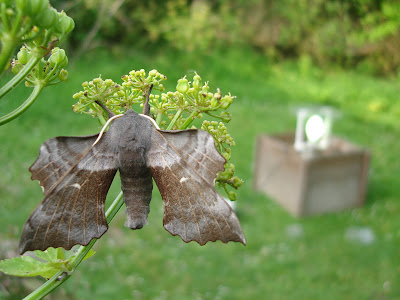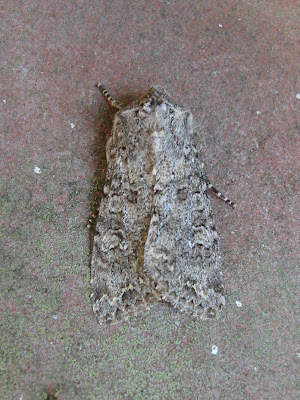The last week of May saw an increase in the moths coming to the trap mainly due to the warmer weather.
The first big hawkmoth of the season was this poplar hawkmoth, (with the Skinner moth-trap in the background), was first noted on the 23rd and peaking five nights later with 7 in the trap. Last spring the poplar hawk was recorded on several occasions but never more than just a couple at a time.
The white ermine is usually a regular during May and June although so far it's been seen on only two nights. The foodplant of the larvae include docks and dandelion, of which there are lots around the park
This scorched carpet pictured above, found on the 26th, is the first record for the park, despite it being quite frequent across the county. It's foodplant is spindle and I wonder if the handful of small trees I planted in the park 20 years ago have finally lured in this scorched carpet.
This white colon moth in the photo above found on the 26th, has been noted at the park on 2 or 3 previous occasions. It's foodplant is the frosted orache which is found mainly on the beaches, so the range of this moth is along the coast too.
This migrant silver-Y moth arrived with a group of nine others in the trap on the 26th. Two nights later only three of them were still around.
The diminutive least black arches pictured above, is the size of a micro-moth. In the last couple of years it seems to have increased a little so that it's being recorded on several nights during the spring rather than just one or two nights. Three were noted in the trap on the 23rd May.
The lime-speck pug is a small moth with a distinctive wing-shape. It seems to be having a better spring than last year with six already noted on the 24th May.
Other moths noted during the last few days in May included maidens blush, red twin-spot carpet, green carpet, common swift, brindled pug, common carpet, sandy carpet, garden carpet, brimstone, clouded silver, white-spotted pinion, purple bar, chinese character, yellow belle, coxcomb prominent, swallow prominent, chocolate tip, white-point, knotgrass, rustic shoulder knot, marbled minor and the shuttle shaped dart.








2 comments:
You're now 'breeding' moths??? What a beautiful picture though.
Haven't started breeding moths but just couldn't resist seeing a little hairy caterpillar transform into this striking moth. - Dougal
Post a Comment